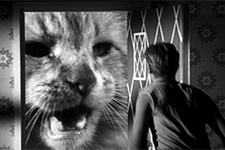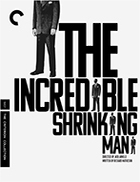The Incredible Shrinking Man
|  The Incredible Shrinking Man is essentially two separate films. On the surface, it is an entertaining science fiction yarn about a man who, having been exposed to a mysterious cloud of radioactive dust while on vacation, begins to steadily shrink day after day. Beneath the surface it is a thoughtful and complex allegory about masculinity and suburban idealism of the Eisenhower years, with the protagonist’s increasing diminution affecting him not just physically, but also emotionally, socially, and sexually (although the latter could only be alluded to via emotional tension with his wife). As he grows smaller, he grows angrier and more aggressive, an ultimately fruitless means of offsetting his diminishing physical stature. In a culture that prizes size, strength, and virility, a shrinking man is destined for ridicule and debasement, which culminates in a literal struggle for survival against ordinary household objects and denizens. As befits a mid-budget science fiction programmer from Universal-International, which produced scores of them in the 1950s and ’60s, The Incredible Shrinking Man is lean and efficient in its storytelling, using the opening credits to tease the existence of the radioactive cloud. As soon as Jack Arnold’s director’s credit fades, we are introduced to Scott Carey (Grant Williams) and his wife Louise (Randy Stuart) while they are vacationing on his brother’s boat in the ocean, and only moments later they are floating through the toxic cloud (Louise, who has gone down below to get a beer, is unaffected). We then immediately cut to Scott and Louise’s quiet, happy suburban life, which is gradually derailed by Scott’s unexplained shrinking, which he notices at first via his clothes, which are suddenly too big. His doctor, as doctors tend to do in science fiction movies, downplays his loss of weight and height, but soon it becomes all too apparent that something truly extraordinary is happening, which is finally confirmed when Scott realizes that Louise no longer has to reach up to kiss him (the “size matters” sexual connotation here is all too apparent). From there, the film takes us through a series of dramatic sequences, each of which reveals how much more Scott has shrunk. A conversation with Louise and his brother, Charlie (Paul Langton), cleverly hides him until a reverse angle suddenly reveals him sitting in a regular sized chair that makes him appear to be a toddler. Later, we see him napping on a sofa, after which it is revealed that he is actually inside a doll house, having shrunk to only a few inches in height. Along the way he feuds with Louise as she tries to console him, but he is only too aware of how his physical shrinking has made him a freak and an outcast (the television stations park their trucks outside, hoping to get a glimpse of him, and the newspapers carry big headlines about his small stature). At one point he leaves the house and strikes up a brief relationship with Clarice Bruce (April Kent), a small person working in a travelling carnival. Their interactions remain purely platonic (at least as far as we can tell), but there is still an air of extramarital sexuality, as Scott is drawn to Clarice because they share something that he cannot share with Louise. Scott’s self-awareness makes his predicament all the more painful, and his emotional struggles, which Grant Williams conveys with great conviction, keep the film’s scenario from becoming inadvertently amusing or silly. The special effects available at the time were limited, but the filmmakers devise a clever mix of techniques to depict Scott’s otherwise staid, normal world becoming increasingly alien, beginning with oversized sets and props and eventually working their way to optical effects and compositing. The film’s second half takes place almost entirely in Scott’s basement, where he tumbles after being chased and almost killed by the family cat, which Louise accidentally lets inside on her way to the store. When she returns, she believes that the cat has eaten Scott, after which she leaves, essentially abandoning him in the basement where he has virtually no chance of escape, having shrunk to less than an inch in height. Jack Arnold, an experienced contract director who had already helmed a number of Universal-International’s science films, including It Came From Outer Space (1953) and The Creature From the Black Lagoon (1954), turns Scott’s predicament into a suspenseful mini-epic of survival. Gaps between boards on a shelf become a cavernous expanse, a leaking water heater becomes a Biblical flood, and a spider turns utterly monstrous. And all the while he continues to shrink, drawing us toward a dark and unexpectedly philosophical conclusion that is quite the antithesis of the typical Hollywood ending. The 1956 source novel, The Shrinking Man, was written by Richard Matheson, who became a regular contributor to Rod Serling’s The Twilight Zone and had previously published I Am Legend (1954), which, like The Shrinking Man, puts an otherwise ordinary suburban husband into an extraordinary situation (in that case, being the last man on earth after a pandemic has wiped out the human population and resurrected many of them as zombie-like vampires). Matheson’s work frequently engaged with issues of modern masculinity and testing its limits, and his books fit in with a strain of American literature in the 1950s that attacked the conformity of suburban existence, which include Sloan Wilson’s The Man in the Gray Flannel Suit (1956), John Keats’s The Crack in the Picture Window (1957), and Richard Yates’s Revolutionary Road (1961). Thus, it is not hard to see The Incredible Shrinking Man as an extension of this critical project, albeit wrapped in the form of a sci-fi thriller. Grant Williams, who Arnold had previously directed in supporting roles in the Westerns Outside the Law (1956) and Red Sundown (1956), gives an outstanding performance, both physically and emotionally, and it is a shame that his work wasn’t better recognized and his career didn’t develop accordingly. He spent most of the 1960s working in television, and he appeared in a few, mostly forgotten films in the early 1970s, including the X-rated How’s Your Love Life? (1971) and Doomsday Machine (1971), a sloppy low-budget disaster that was filmed in 1967 but not completed for another five years. It is easy to forget that Williams literally carries the entire second half of the film, where he is the only human character on screen. His anger and frustrations are palpable, and those emotional contours take on physical form with the challenges to survival that he faces in the basement. Matches, paint sticks, and pins take on new form and function in Scott’s world, offering a clever riff on the lone-man survival tale that is at least as old as Robinson Crusoe. The fact that The Incredible Shrinking Man succeeds so well in engaging us on the level of pure experience while also challenging the social norms and conventions of its era makes it a unique and compelling film, far outstripping its B-movie status.
Copyright © 2021 James Kendrick Thoughts? E-mail James Kendrick All images copyright © The Criterion Collection | |||||||||||||||||||||||||||||
Overall Rating: 


 (3.5)
(3.5)


